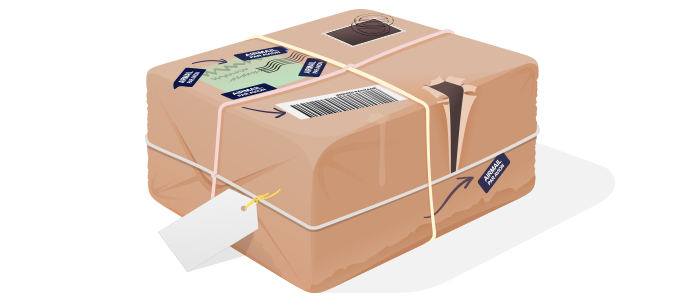CBP Cracks Down on E-Commerce Shipments
CBP Cracks Down on E-Commerce Shipments
Advance Screening Pilot
In early 2018, U.S. Customs and Border Protection released its E-Commerce Strategy in response to the rapidly growing market of low value imports into the United States. The U.S. market has become a “small, just-in-time package,” society, creating inspection challenges for CBP. To address this challenge, CBP published the E-Commerce Strategy. One solution to the growing security threat of the United States via small shipments is to devise a plan much like our current Importer Security Filing on large shipments. In fact, on July 23, 2019, CBP announced it is conducting a voluntary test to collect certain advance data related to shipments under 321 of Tariff Act of 1930.

Background
In 2009, Importer Security Filing was implemented in order to monitor and scan potential harmful cargo coming into the United States via ocean containers via “10+2” data elements required to be submitted before sailing from origin port. At the time of implementation, this was a bit of a headache for importers and U.S. Customs Brokers. Today, it has become an everyday practice and is done with ease. ISF is required to be filed with U.S. Customs and Border Protection 24 hours prior to sailing from last origin port. In other words, importers should send all necessary data to their U.S. Customs Broker prior to shipping the order to avoid being flagged for a U.S. Customs exam.
Section 321 Data Pilot
Section 321 provides for an administrative exemption from duty and taxes for shipments of merchandise (other than bona-fide gifts and certain personal and household goods) imported by one person on one day having an aggregate fair retail value in the country of shipment of not more than $800. As mentioned above, CBP will conduct a test pilot where participants will electronically transmit certain data elements pertaining to these shipments to CBP in advance of arrival. CBP is conducting this test to determine the feasibility of requiring advance data from different types of parties and requiring additional data that is generally not required under current regulations in order to effectively identify and target high-risk shipments in the e-commerce environment. Having this data will help CBP more accurately and efficiently target section 321 shipments.
Participation
CBP is seeking participation from stakeholders in the e-commerce environment, including carriers, brokers, freight forwarders, as well as online marketplaces. There are no restrictions with regard to organization size, location, or commodity type. Online marketplaces are considered internet-based entities that facilitate e-commerce by (1) connecting third-party sellers with consumers and (2) receiving and processing payment information from consumers, including receiving and processing payments on behalf of the third-party sellers. Online marketplaces generally have detailed information regarding Section 321 shipments, including information relating to the party causing the product to travel to the United States, the final recipient in the United States, and detailed descriptions and pictures of the contents of the shipment. Online marketplaces may also assign sellers with unique identifiers or develop their own known seller programs. This test will enable CBP to assess the ability of online marketplaces to transmit information to CBP that enables CBP to better utilize resources used in inspecting and processing these shipments and better understand the operation of online marketplaces.
More on the Pilot
The test pilot is voluntary. It will begin on August 22, 2019 and run for approximately one year. CBP will accept applications from prospective pilot participants at any time, including after the pilot commences, until CBP has identified a sufficient number of eligible participants. If you’re interested in participating and want more information, click here. Participants will provide information that identifies the entity causing the shipment to cross the border, the ultimate recipient, and the product in the shipment with greater specificity, in advance. CBP will test the feasibility of using the additional data elements, transmitted by multiple entities for a single shipment, to segment risk. For example, CBP may compare a picture of the product (transmitted by an online marketplace) to an x-ray image of the package (transmitted by the carrier) to determine if the picture of the product and x-ray image match. In sum, the pilot will enable CBP to determine if requiring additional data and involving non-regulated entities will enable CBP to address the threats and complexities resulting from the vast increase in Section 321 shipments, while facilitating cross-border e-commerce.
[maxbutton id=”35″ url=”https://www.federalregister.gov/documents/2019/07/23/2019-15625/section-321-data-pilot” text=”View Full Federal Register Notice” ]
E-Commerce Capabilities
Scarbrough’s capabilities expand beyond that of a traditional freight forwarder/U.S. Customs broker. Scarbrough offers a full service distribution and order fulfillment service catered to the e-commerce online marketplace. With warehouses strategically located across the nation, we cover 97%+ of the U.S. population via 2-day ground shipping. Our state-of-the-art technology, API and EDI capabilities allow seamless communication between platforms, and our customer service is a real thing. Scarbrough develops a true partnership with clients and acts as an extension of your company. Your problems are our problems.
Our distribution and fulfillment experts can help guide your company in the right direction. Need help optimizing your supply chain or distribution model? Need help with your Amazon or other online marketplace orders?
We are offering a free 30-minute consultation to provide the e-commerce trade community with the expertise we are proud to possess.
Oops! We could not locate your form.

